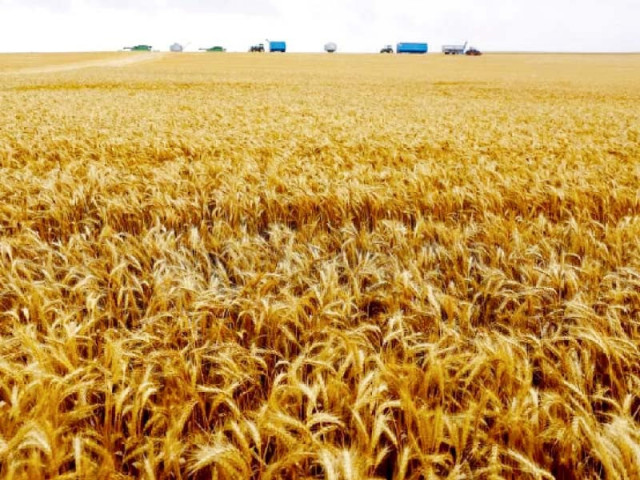PM directs Punjab govt to provide 0.2m MT wheat to K-P
Orders come as experts fear wheat production to be up to 200,000 tonnes less this year

Prime Minister Shehbaz Sharif on Friday directed the Punjab government to immediately procure 200,000 metric tonnes of wheat for Khyber-Pakhtunkhwa.
Premier Shehbaz gave the orders in response to Awami National Party (ANP) leader Aimal Wali Khan’s request. In a tweet on social media platform Twitter, Shehbaz said, "Dear Aimal sb: I have directed the Punjab govt to immediately procure 200000 metric ton of wheat for KP so that the province's food needs are sufficiently met. More wheat can be purchased if KP needs more. Thank you for bringing this to my knowledge! "
Aimal replied, “I truly appreciate your prompt attention to the wheat procurement matter and the pledge to settle it in a timely fashion. We look forward to working with you & the provincial government(s) to proactively identify and address other issues as well.”
However, the wheat production target in Punjab is likely to be affected this year due to below normal rainfall and abnormal rise in temperature during Rabi season.
According to experts, premature heat wave has affected wheat crop in many districts. But agriculture department officials said that the crop which was sown on time would have an improved yield.
Farmers in Lahore, on the other hand, claimed to have grown 10 to 15 tonnes per acre more wheat through unconventional methods.
According to Punjab Crop Reporting Service, 75% wheat has been harvested in Punjab by mid-April.
The yield in rain-fed areas, according to a survey, is 32.32 tonnes per acre as against 33.21 tonnes per acre last year.
READ 14 check posts set up to control wheat smuggling
The overall wheat production in rain-fed and irrigated areas declined by 0.1 per cent over the previous year, but farmers, on the other hand, did not consider the survey to be factual.
Agriculture Republic head Aamer Hayat Bhandara said the total wheat production declined by six to nine per cent, while areas where average wheat production was 40 to 50 tonnes per acre declined to 32 to 40 tonnes per acre.
He said that there were many reasons, including climate change, shortage of agricultural water, increase in prices of fertilisers and diesel, behind the decline in production of other crops especially wheat. “The war between Russia and Ukraine can also cause us to face a shortage of wheat.”
He said the Punjab Agriculture Department has set a production target of 20.5 million tonnes of wheat this year. Due to rising temperatures in late March and early April in South Punjab, the wheat crop was ready early and the grains did not germinate which was why, in Central Punjab where temperature reached 40 degrees Celsius, the preparation and harvesting of the crop was delayed as the wheat crop had shrunk, which would reduce the average yield.
He said that Punjab's total wheat production was expected to be 20.36 million tonnes by mid-April but it was less than expected. The Punjab Agriculture Department officials are hopeful that now that the wheat harvest was under way in Lahore, Faisalabad and Gujranwala which will be completed by mid-May, there was a strong possibility that they would get closer to the production target but experts fear that wheat production in Punjab may decrease by 100,000 to 200,000 tonnes.
Dr Anjum Ali, the director general of Department of Agriculture (Extension), Punjab, told The Express Tribune that they were hopeful that the wheat production target would be achieved. “Wheat production may be affected in areas where wheat was planted late and farmers did not irrigate their crops during the early onset of heat wave.”
He said that this year as the rainfall was less than normal and the melting of snow in the mountains was also affected, the Anhar (irrigation) department had reduced the canal water by 47% in March. On the other hand, Syed Babar Ali Bukhari, a farmer and agronomist, claimed that despite the current unfavourable conditions, he achieved a wheat yield of 50 tonnes per acre, which was 10 times more than the normal production in the area of 15 tonnes per acre.
Bukhari said that he used organic formula for better production of wheat which not only increased the yield per acre but also the size of wheat stalk and the number of grains was more than that of ordinary wheat. (With input from app)



1733130350-0/Untitled-design-(76)1733130350-0-208x130.webp)















COMMENTS
Comments are moderated and generally will be posted if they are on-topic and not abusive.
For more information, please see our Comments FAQ